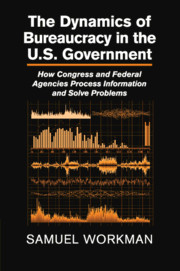 The Dynamics of Bureaucracy in the US Government
The Dynamics of Bureaucracy in the US Government Book contents
- Frontmatter
- Contents
- List of Illustrations
- List of Tables
- Acknowledgments
- 1 Bureaucracy and Problem Solving
- 2 The Dual Dynamics of the Administrative State
- 3 The Regulatory Process as an Attention Mechanism
- 4 Problem Monitoring in the Administrative State
- 5 Problem Prioritization and Demand for Information
- 6 Problem Solving and the Supply of Information
- 7 Information, Bureaucracy, and Government Problem Solving
- Appendix A Conceptualization and Measurement
- Appendix B Statistical Models
- References
- Author Index
- Subject Index
5 - Problem Prioritization and Demand for Information
Published online by Cambridge University Press: 05 May 2015
- Frontmatter
- Contents
- List of Illustrations
- List of Tables
- Acknowledgments
- 1 Bureaucracy and Problem Solving
- 2 The Dual Dynamics of the Administrative State
- 3 The Regulatory Process as an Attention Mechanism
- 4 Problem Monitoring in the Administrative State
- 5 Problem Prioritization and Demand for Information
- 6 Problem Solving and the Supply of Information
- 7 Information, Bureaucracy, and Government Problem Solving
- Appendix A Conceptualization and Measurement
- Appendix B Statistical Models
- References
- Author Index
- Subject Index
Summary
Agenda setting in Congress profoundly influences signaling about policy problems by the federal bureaucracy. The prioritization of problems by Congress makes congressional influence on the federal bureaucracy so pervasive that it is intrinsic to the system of dual dynamics and operates even in the absence of structured incentive systems. The U.S. Constitution mandates that Congress takes up the authority position in Elmore's problem, while bureaucracy supplies the bottom-up expertise for government decision making. The process of prioritizing problems for attention in Congress creates a demand for information that tunes signals about problems from the bureaucracy and structures the supply of information.
These top-down influences are different from the more formal methods of controlling bureaucracy. The key baseline assumption of most characterizations of the system is that bureaucracies hold private information that must be induced through incentives and disincentives. Therefore, absent a fully adequate contract and system of monitoring, bureaucracies undersupply information relevant to the policy and political calculations of legislators.
The dual dynamics of prioritization and problem solving depart from this key assumption of the nature of the information supply in the policy process. The ability to steer policy change is predicated on influencing how problems are defined and understood at upper levels of government. Bureaucracies supply information in an effort to craft problem definitions beneficial to their organizations, constituencies, and their own interests in policy making. In this model, undersupply is not a concern. Instead, the problem for policy makers lies in influencing the types, quantity, and nature of the massive amount of information generated by the federal bureaucracy.
Congress shapes the supply of information from the bureaucracy through three mechanisms. All three mechanisms relate to agenda setting in Congress and the way members of Congress choose to allocate scarce attention to the array of problems on the agenda. The mechanisms of prioritization so influential for the supply of information do not bear the heavy cost of contracts embodied in legislation or the burden of intensive monitoring.
Information
- Type
- Chapter
- Information
- The Dynamics of Bureaucracy in the US GovernmentHow Congress and Federal Agencies Process Information and Solve Problems, pp. 107 - 129Publisher: Cambridge University PressPrint publication year: 2015